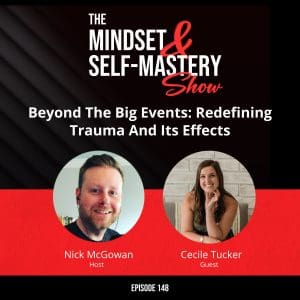“You’re not cognitively holding onto that unsafety. It’s your body that’s holding the unsafety.”
In this episode, Nick speaks with Cecile Tucker about the complexities of trauma, exploring its various forms and impacts on individuals. They discuss the importance of understanding trauma beyond major life events, the daily chaos that can contribute to trauma, and the significance of experiential counseling in bridging the gap between awareness and action. Cecile emphasizes the need for reprogramming the subconscious to heal trauma, the effects of generational trauma, and the importance of integration in applying learned insights.
What to listen for:
- Trauma can manifest in daily routines and chaos.
- Understanding trauma requires a broad definition beyond major events.
- Experiential counseling helps clients learn new responses to trauma.
- Reprogramming the subconscious is essential for healing.
- Generational trauma can affect individuals without their awareness.
- Healing is a process that involves safety, processing, and integration.
- Small shifts in personal routines can create significant ripples in healing.
- Self-awareness is crucial in identifying one’s stage in trauma work.
- Integration of trauma insights is a natural process when blocks are removed.
- Healing oneself contributes to the healing of communities.
“Trauma is just being in your sympathetic and not being able to step back into the parasympathetic. The difference between trauma and non-trauma is can you choose to flow between, or are you stuck in the sympathetic?”
- Trauma isn’t just an emotional experience—it’s a nervous system response, particularly being stuck in the sympathetic (fight-or-flight) mode without being able to return to the parasympathetic (rest-and-digest).
- The key difference between trauma and non-trauma experiences lies in whether we can switch back and forth between these two states. Trauma keeps us locked in survival mode.
- Healing trauma means regaining the ability to move between high-Stress and calm states, not just avoiding stress altogether.
- Becoming mindful of your nervous system state can help you recognize when you’re stuck in fight-or-flight mode, a crucial first step toward healing.
- The power to heal comes from learning how to regulate and shift between these states, which is a skill that can be developed through various healing modalities.
“When we let go of understanding it and we simply work with what is, our body helps us transform that trauma when we give it the space to do so.”
- Healing trauma isn’t always about intellectually understanding it—sometimes, the mind overanalyzes, while the body just needs space to heal on its own.
- The body holds the trauma and has the ability to release it. Instead of trying to “figure it out,” creating a safe space for the body can naturally lead to transformation.
- Trying too hard to control or solve trauma can create resistance. Allowing things to flow can be more effective than constantly seeking answers.
- The body has an innate Wisdom. Giving it time, rest, and nurturing can facilitate deep healing beyond what the mind can comprehend.
- Sometimes, the best approach is to be present with whatever comes up rather than striving for an ideal or a “fix.” Acceptance is a vital part of the healing process.
“When each person heals, we reach this point where we then want to help others heal. The healthier we become, the healthier our communities become, our systems become.”
- Personal healing doesn’t just benefit the individual. When someone heals, they naturally want to help others, creating a ripple effect in their community.
- As more people heal, the collective well-being of families, communities, and even larger systems like healthcare and Education elevates.
- Healing brings people together. When individuals feel whole, they often feel compelled to share that healing energy with others, fostering stronger community bonds.
- Personal transformation can be a catalyst for social change. Healthier people create healthier systems, whether that’s in families, organizations, or societies.
- Once we heal, we often develop greater empathy and a natural inclination to serve others. This can lead to leadership and community-building roles that foster collective healing.
About Cecile Tucker
Cecile Tucker is not just a trauma clinician but also the proud owner of WellMind Counselling, a trauma counseling agency. Cecile is passionate and somewhat nerdy about her love for understanding trauma and trauma healing. She aims to equip others with the tools and insights needed to navigate the complexities of trauma care, both for themselves and others.
Resources:
Check out these other episodes about trauma.
Are you wondering what your purpose is in this world?
Check out our “The 3 Steps to Pinpointing Your Purpose and Charting a Clear Course to Aligned Living”.
Interested in starting your own podcast or need help with one you already have? Send Nick an email or schedule a time to discuss your podcast today!
Thank you for listening!
Please subscribe on iTunes and give us a 5-Star review!
Listen to other episodes
Guest Inquiries right here: podcasts@chooseyourcalling.com
Your Friends at “The Mindset & Self-Mastery Show”
The post Beyond The Big Events: Redefining Trauma And Its Effects With Cecile Tucker appeared first on Choose Your Calling.
I’m on a path toward self-mastery, doing the best I can each day to manage my mindset and emotions and help others do the same.
